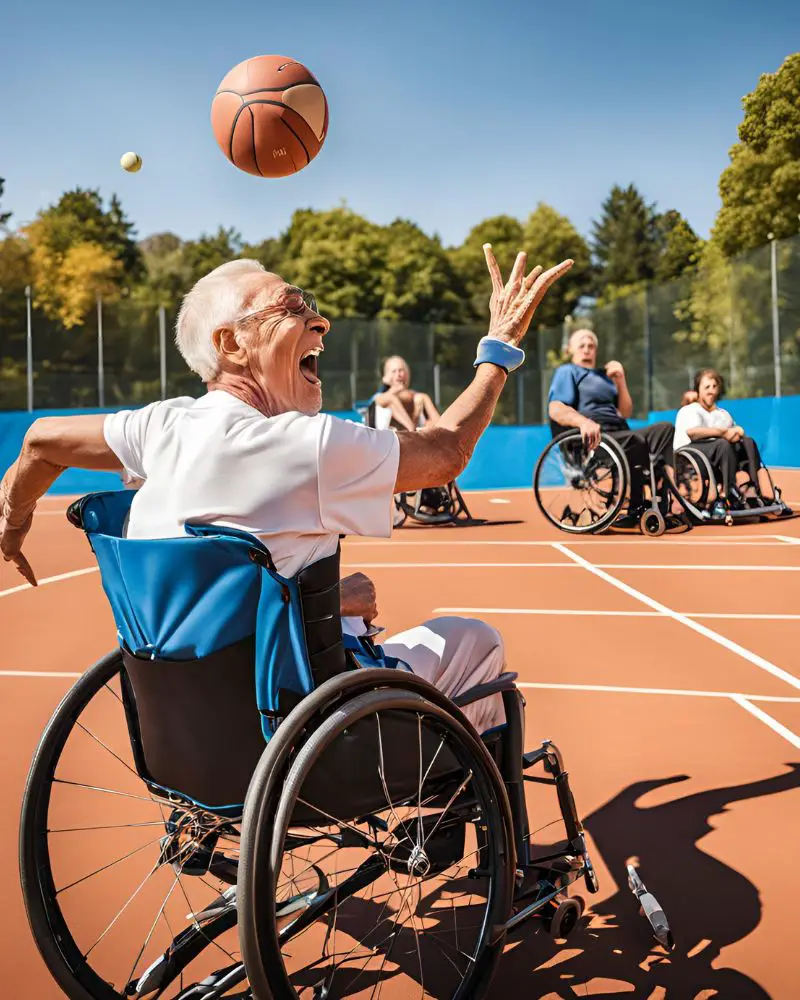As an Amazon affiliate, I may earn from qualifying purchases. Please read our Disclaimer and Privacy Policy.
Hobbies for people with mobility issues can mean different things to different people.
For example, people with rheumatoid or osteoarthritis may have symptoms that come and go. Others, however, may have permanent mobility issues caused by injury, illness, neurological conditioins, or congenital factors.
My point is that there are different kinds of mobility issues. They can be categorized as static, chronic, or episodic (come and go).
This blog post will take you through 15 examples of hobbies for people with mobility issues.
How to Pick The Right Hobby for You!
Sometimes, we pick hobbies based on external influences. Perhaps your friends are into a particular activity, or maybe there’s a voice in your head telling you that you “should” be doing something.
The reality is that we’re all different. Ultimately, the hobby you choose should boost mental health, not cause undue stress. It should promote social interaction and leave you with a sense of accomplishment.
So how do you know which hobby to pick? I suggest asking yourself the following questions to get started.
What are my interests and passions?
- What activities do I enjoy doing in my free time?
- What topics, subjects, or activities do I find myself naturally drawn to?
- Is there something I’ve always wanted to try or learn more about?
What are my goals for a hobby?
- Am I looking for relaxation and stress relief, or do I want something more challenging?
- Do I want to develop a skill or just have fun?
- Am I hoping to meet new people or build a social network?
What is my available time?
- How much time can I realistically commit to a hobby each week?
- Do I want a hobby that can be done in short bursts, or am I open to longer, more immersive activities?
What is my budget for a hobby?
- Can I afford the materials, equipment, or membership fees associated with hobbies for people with mobility issues?
- Do I prefer a low-cost hobby, or am I willing to invest in something more expensive if it brings me joy?
How physically active do I want to be?
- Do I want a hobby that gets me moving, like hiking or dancing, or something more sedentary, like reading or crafting?
- Where should I look for hobbies for people with mobility issues?
- READ: 21 Effective Resistance Band Exercises for Over 60
What skills or talents do I already have?
- Do I have any existing skills that I want to expand on, such as art, music, or writing?
- Would I prefer a hobby that challenges me to learn new skills, or one that I can easily enjoy with what I already know?
What kind of commitment do I want?
- Am I looking for a hobby that I can enjoy casually or one that will require a deeper time and emotional commitment?
- Do I want a hobby that can become a long-term pursuit or one that I can enjoy as a short-term diversion?
Do I want to do this alone or with others?
- Would I prefer a solitary hobby, like journaling or gardening, or do I want something social, like team sports or board games?
- How important is the social aspect of a hobbies for people with mobility issues?
If you’re interested in getting your better half involved in activities, read: 69 Best Mind-Stimulating Hobbies For Men Over 60
You should also read: 19 Easy and Fun Hobbies For Couples Over 50
How will this hobby impact my lifestyle?
- Will this hobby fit into my daily routine without overwhelming me?
- Will it help improve my mental or physical well-being, or provide a sense of accomplishment?
What kind of setting or environment do I prefer?
- Do I want to engage in an indoor or outdoor activity?
- Do I prefer a hobby that can be done at home, or one that requires travel or a specific location?
By answering these questions, you can narrow down your choices and find a hobby that aligns with your interests, lifestyle, and personal goals.

Unlocking the Powerful Health Benefits of Hobbies
Spending time on hobbies offers a wealth of health benefits, both for the mind and body.
Engaging in activities that bring you joy or allow you to explore new things can significantly reduce stress and improve mental well-being.
Hobbies like gardening, painting, or playing an instrument can help release dopamine, the “feel-good” neurotransmitter.
Feeling blue?
Being involved in hobbies can serve as a healthy distraction, helping to alleviate symptoms of depression by providing a sense of purpose and accomplishment.
In terms of physical health, certain hobbies can also have a direct impact, especially those that require movement or physical activity.
Need a little help staying physically active?
Since this is a blog post about hobbies for people with mobility issues, I think it’s important to mention that there are a number of assistive technologies available these days.
Hand cycles, recumbent bikes, and seated ellipticals can be good options for maintaining physical fitness.
Not sure where or how to start? I suggest seeing a physical therapist. They can suggest ways to adapt hobbies and recreational activities for people with mobility issues.
Interested in pickelball? Read: Pickleball Etiquette: 5 Do’s and Don’ts On Court
It all adds up
Don’t beat yourself up because you “only” walked for 10 minutes around the block. Getting outdoors can help clear your head, reduce anxiety, improve blood flow, and enhance sleep quality.
15 Engaging Hobbies for People With Mobility Issues
As promised, here are 15 hobbies for people with mobility issues. There are hundreds of options out there, including pottery making. However, I’ve picked these 15 to help get you started.
I’ve written several articles about pottery making. If you’re interested, you can check them out here:
Cool Pottery Ideas for Beginner to Advanced Potters
How to Tell if Pottery is Valuable: A Beginner Guide
7 Vital Pottery Studio Supplies, Equipment, and Tools
Is Pottery Microwave Safe? 5 Easy Ways to Check
1. Chair Yoga: A Great Way to Stay Active
Chair yoga is a great way to stretch and strengthen muscles. This practice improves flexibility, promotes physical fitness, and fosters a sense of calm.
In fact, chair yoga offers significant benefits to a variety of people experiencing loss of mobility.
The following video will give you a better idea of what to expect in chair yoga. I recommend practicing chair yoga with a certified yoga instructor before practicing at home.
A qualified instructor will ensure you’re using the correct form to get the most out of the exercises.
2. Indoor Gardening: Fresh Air & Creativity at Home
Did you know that 55% of American households engage in gardening activities? According to Scotts Miracle-Gro and Wakefield Research, that number is on the rise.
I’ve tried my hand at gardening and frankly, it was brutal on my back and hands.
Thankfully, indoor gardening is just as rewarding. In fact, it’s a creative and fulfilling way to engage with nature without ending up in pain.
Watching plants grow and thrive is a great feeling!
3. Bird Watching: Connect with Nature from Your Chair
There was a time when I thought bird watching was a boring waste of time. The older I get, however, the more it interests me.
I’m not the kind of person to pack up a tri-pod and head into the forest to bird watch. I’m happy to watch birds visit my feeder from the comfort of my home.
The beauty of bird watching is that you can make it whatever you want it to be. For more information on the benefits of bird watching, read: A Beginner’s Guide to Bird Watching For Couples Over 50
If you’re looking for the best hobbies for people with mobility issues, bird watching is definitely at the top of the list.
4. Music Therapy: A Fun Way to Boost Mood
I can attest to the benefits of music for improving mood, increasing energy, and stimulating creativity. It’s helped me ease anxiety and got me moving when I really didn’t feel like it.
I prefer to listen to music, but it’s never too late to learn to play an instrument.
Adaptive instruments, like easy-to-play keyboards or handheld percussion instruments, can make learning music or playing more comfortable and enjoyable.

5. Card Games: Socialize and Exercise Cognitive Skills
When I was a little girl, I remember lying in bed listening to my grandparents playing cards in the kitchen.
There was a lot of laughter and a lot of knocking on the table. I didn’t realize until recently that they were playing Gin Rummy (although there was no actual alcohol involved in the game).
Apparently, the card game involves players “knocking” when they believe they have a good hand.
My point is that card games are a great way to socialize with friends. It can be a fun pasttime that pulls you away from your phone, computer, or television.
6. Digital or Physical Scrapbooking
I was in my late 20’s when scrapbooking was a “thing”. Back then, it involved using physical photographs as the basis for a creative collection of memories.
We used a variety of colorful papers, designs, memorabilia, glitter, and anything else we could get our hands on.
To this day, people still engage in scrapbooking as a hobby. Many hobbyists have moved to digital scrapbooking, however. It’s a modern twist on traditional scrapbooking.
Instead of physical materials, digital tools and software are used to create scrapbook pages on a computer or tablet.
7. Cooking: A New Hobby with Delicious Results
Cooking is a great hobby is you’re a “foodie”. If you love trying new recipes, visiting new restaurants, watching shows like the Food Network, etc., than maybe this is the hobby for you.
Cooking can be adapted to be accessible for anyone. Perhaps you need a seated workspace or ergonomic utensils. You can optimize safety with non-slip mats and long-handled tools.
Non-profit organizations like Rebuiding Together helps retrofit homes, including kitchens, for accessibility.
Don’t throw away your dreams of creating delicious meals because of mobility issues.
8. Learning a New Language: Stimulate Your Brain
Many people have considered learning a new language. I know I have! The prospect used to seem overwhelming until I had an A-HA moment recently.
I’ve always been an all-or-nothing kind of person. It has its pros and cons. The worst thing is that it can prevent me from trying something new.
What I realize now is that I don’t have to learn to speak a new language fluently. And neither do you! Your cognitive function will still be improved from just learning a few phrases.
The point is to enjoy your hobby! It’s a great way to exercise the mind and build new skills.
Plus, there are plenty of apps to help you do that. Just remember, it doesn’t have to be all-or-nothing. There are plenty of hobbies for people with mobility issues.
9. Art Classes: Unleash Your Creative Side
Art classes are a wonderful way to express yourself creatively and tap into your creative side.
Whether drawing, painting, or crafting, these activities engage the mind and improve fine motor skills while providing a relaxing and rewarding hobby.
For me, it’s about the freedom of choosing and mixing colors, feeling the paintbrush on the canvas, and interpreting how I see the woCool Pottery Ideas For Beginner to Advanced Pottersrld through art.
Art is an accessible hobby for anyone. There are countless mediums to choose from (pottery, painting, drawing, etc.) and many ways to modify the process.
If you’re an introvert like me, you might want to take some online classes to get started. Or, you can push yourself out of your comfort zone and gain the benefits of socialization.
Check with your local community college or do an online search for local art classes. Don’t worry about looking for art classes specifically for people with mobility issues. Talk to the instructor to come up with ways to meet your needs.
10. Jigsaw Puzzles: Cognitive Fun for All Ages
My father really got into puzzles when he was in his 70’s. His anxiety got the best of him most of the time. But when he did jigsaw puzzles he could get lost in the process.
Generally speaking, puzzles are a great way to engage the brain. It works cognitive skills, hand-eye coordination, and problem-solving skills.
Puzzles are ideal for people of all ages, including those who may be dealing with severe arthritis or joint pain. You can take your time and work at your own pace.

11. Tai Chi: Gentle Exercise for the Mind & Body
I once knew a man who worked with me at the local community college. When he was stressed out, he would go to the gymnasium, find a corner, and quietly practice Tai Chi.
The calming effect it had on him was remarkable. Tai Chi is a great way to improve balance and flexibility. Since it’s a low-impact exercise, it’s one of several great hobbies for people with mobility issues.
12. Virtual Reality: Explore the World from Home
Have you ever tried virtual reality? I bought a VR headset for my husband a few years ago (he’s 65), and he loved it.
There are so many things you can try! We love the immersive experience of “travelling” to different places, experimenting with wild roller coasters from the safety of the living room, and learning new things.
Try the newest Oculus Quest 2 Virtual Reality Headset!

Facebook account required
- immersive entertainment
- easy setup
- NO computer required
- grab front row seats to live performances!
13. Volunteering: A Sense of Purpose & Social Interaction
There are local charities and religious organizations that are always looking for volunteers. The best thing about volunteering is that it’s an inclusive activity. There’s always something you can help with, no matter what mobility issues you might have.
The key is to find a place that you love supporting. For me, it would be the ASPCA or another animal non-profit group. For you, it might be a food bank, helping the unhoused, shopping for the elderly, and so on.
It’s a great way to give back to your community and meet new friends.
14. Family Tree Research: Discover Your Heritage
People have mixed feelings on whether they feel comfortable sending their DNA to companies like Ancestry.com. I’ve done it and it was a lot of fun discovering cousins I never knew I had.
There are people who have built an impressive family tree by engaging in this intellectual pursuit. It’s a great hobby for both mental health and social connections.
It’s one of many perfect hobbies for people with mobility issues. It also leaves a legacy for years to come.
15. Writing: Express Your Thoughts & Share Stories
I’ve always considered myself a writer. I started writing short stories in elementary school and reading my tales to the class. Yeah, okay, maybe I was a nerd.
I still love writing, though. That’s partly why I write this blog. I can be difficult if you have hand and wrist pain or stiffness. However, there are plenty of ways to make writing more accessible. Most software applications have text-to-speech functionality, for example.
Here are some examples of software that you can buy to get started on your creative writing journey:
Writing, whether it’s journaling, poetry, or storytelling, is a creative outlet that helps keep the mind active.
Summary
In summary, the best hobbies for people with mobility issues are the ones that make you happy. Sometimes it’s hard to step out of our comfort zones, but it’s always worth it.
Participating in enjoyable activities is one of the best ways to stay mentally and physically active. Remember, it doesn’t have to be an all-or-nothing endeavor. Just find something you like and try it out!
Pick more than one hobby to keep you going all year round. Do crossword puzzles on stormy days and take part in more physical activities when the sun is shining. Even people with limited movement can find support and resources to find the right adaptive equipment.
Happy hobby hunting! Let me know what you decide to do in the comments.


